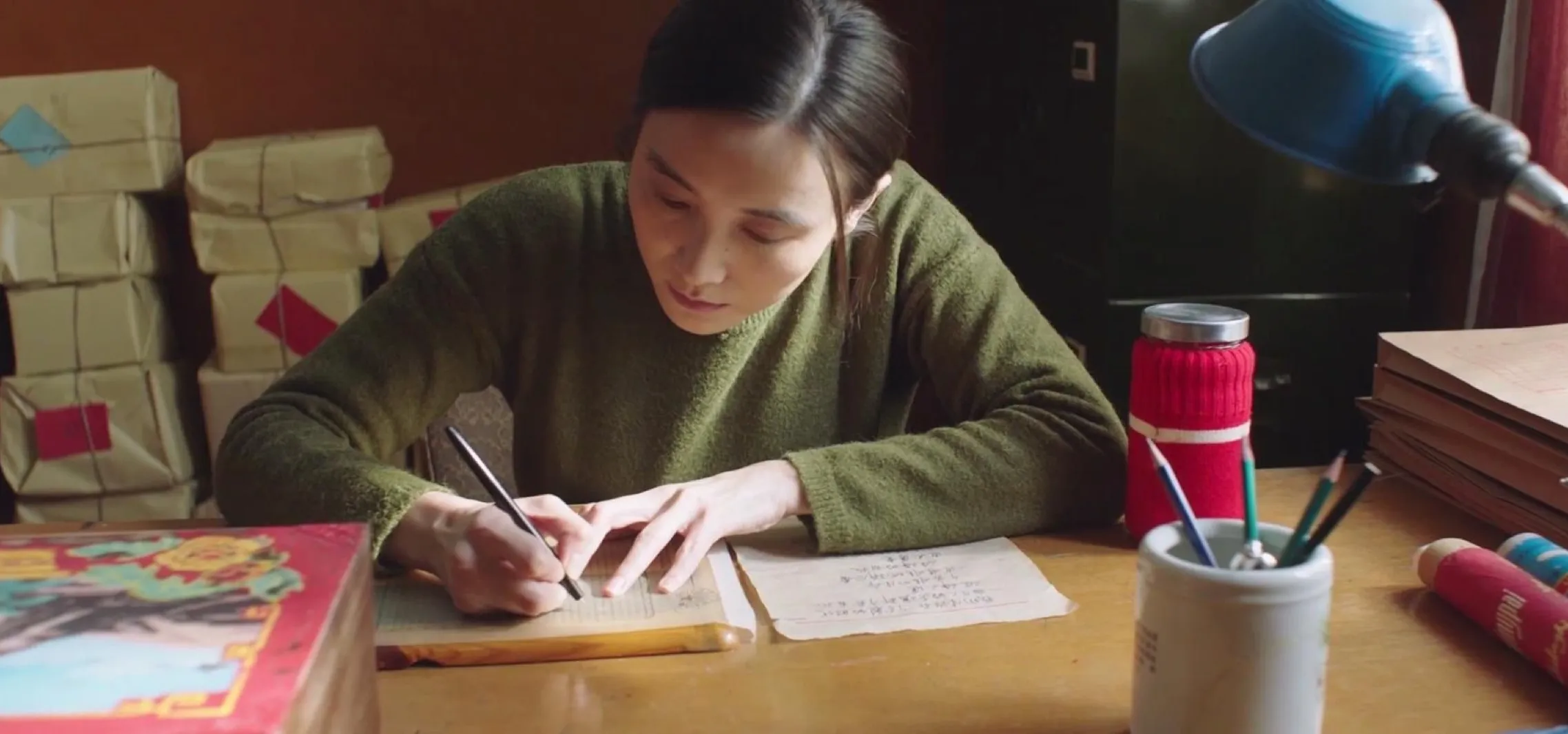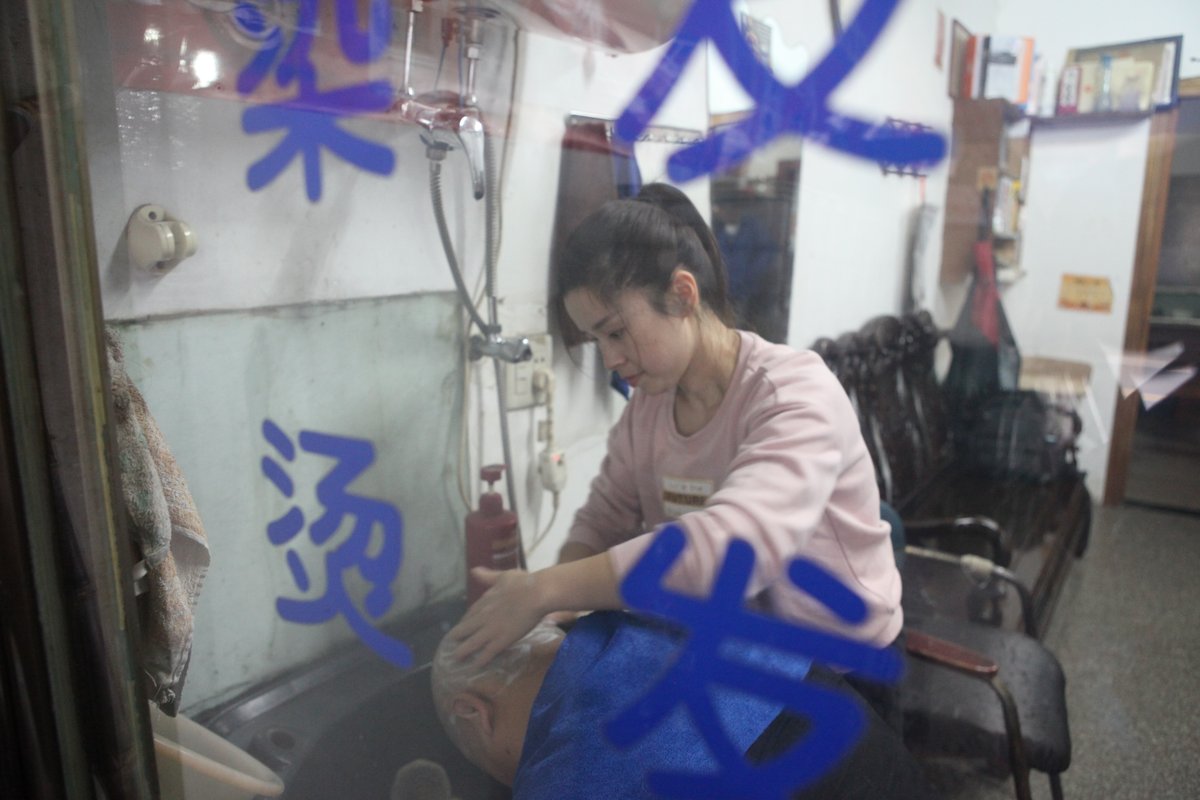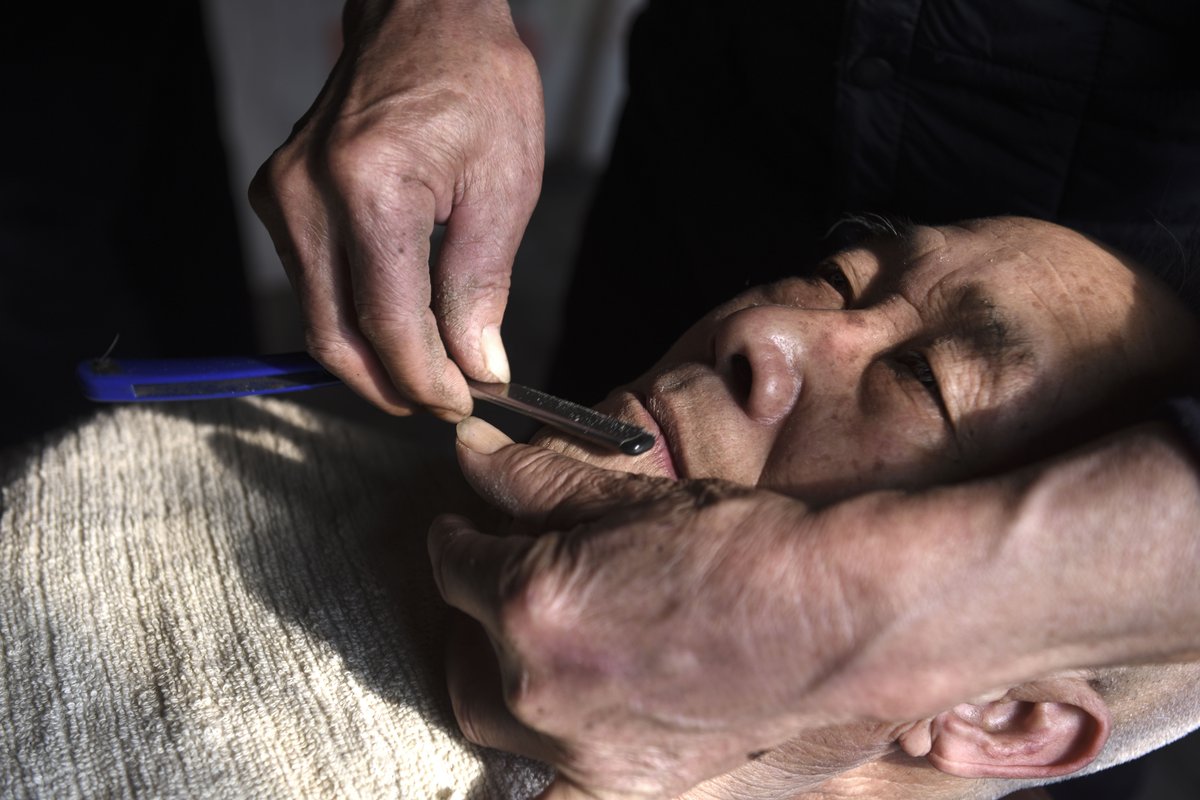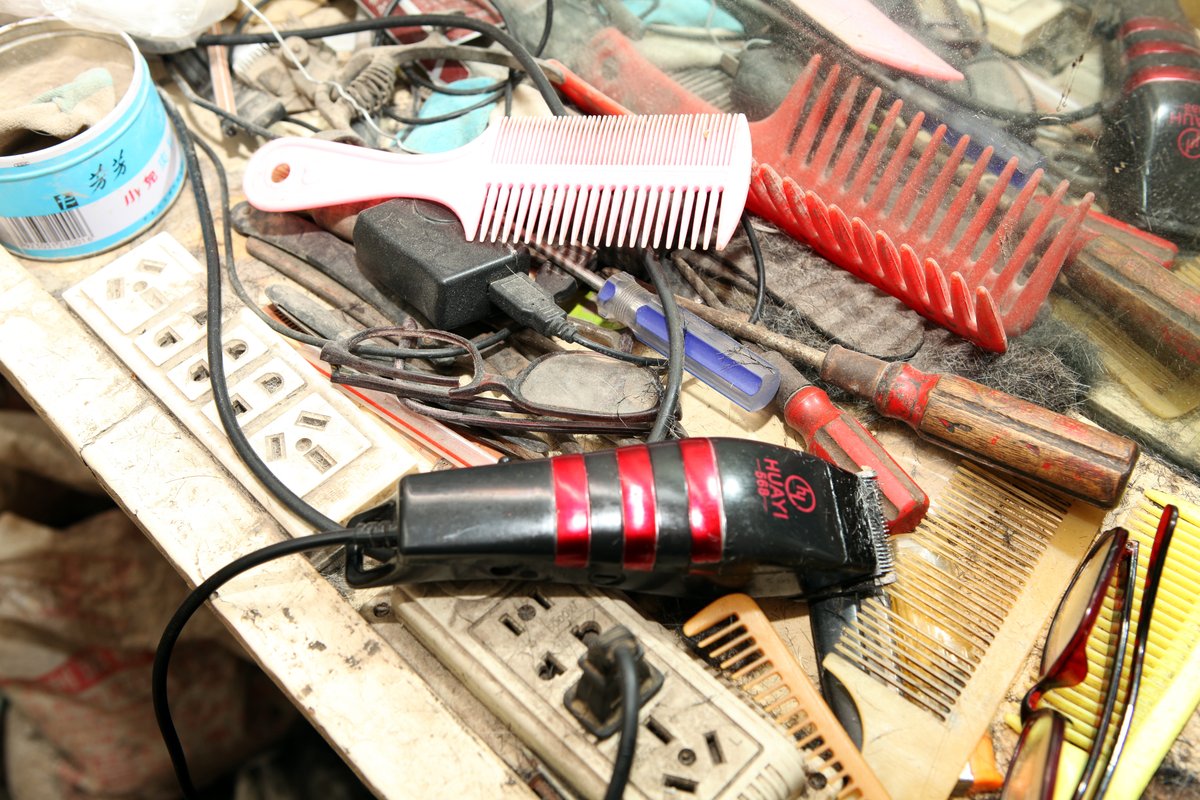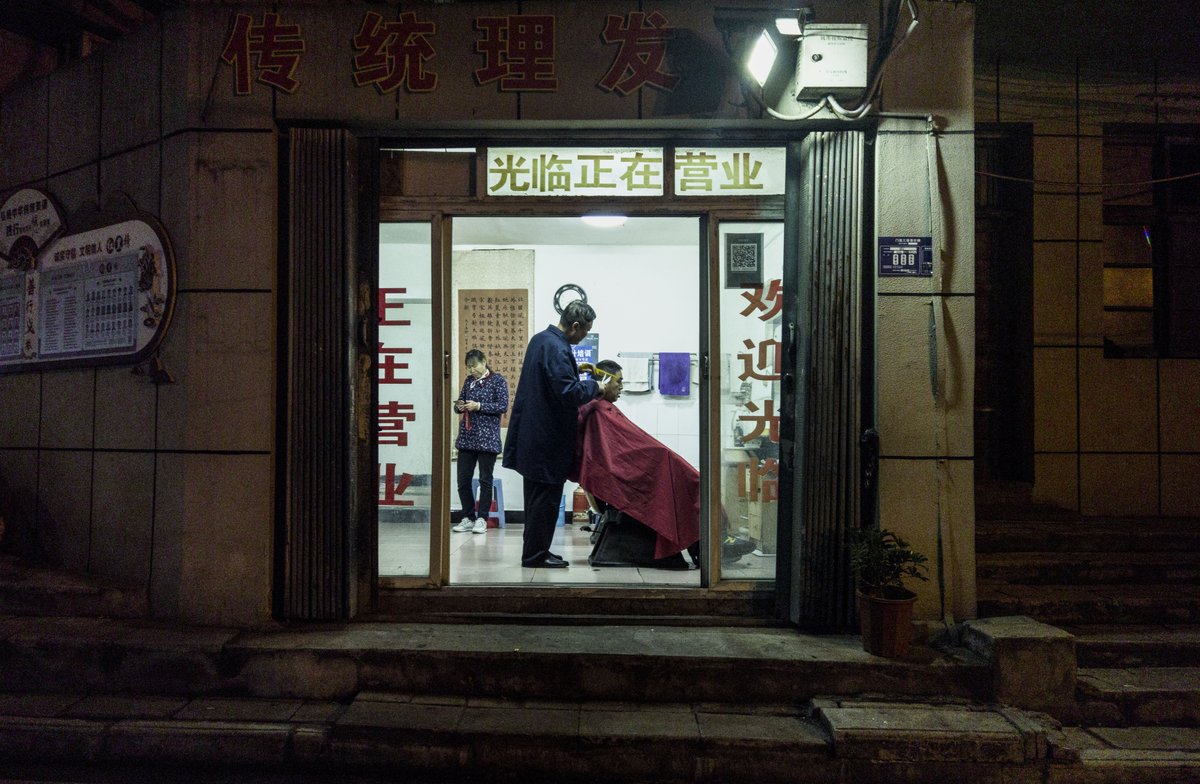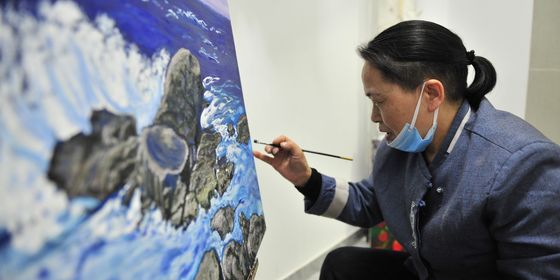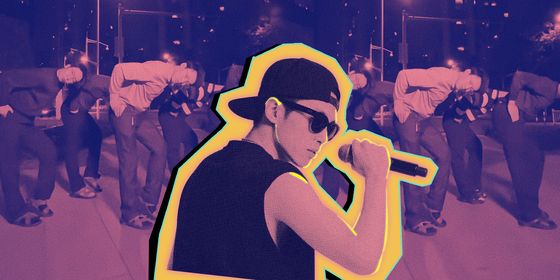On a seedy street in a small town, a 50-year-old woman struggles to chase her literary dreams as she makes a living by cutting hair
1 / 7
She never even finished elementary school, but she fell in love with reading and writing all the same. In reality, given her current skill level, some might only call her a literary enthusiast, but the other literary enthusiasts in this city all like to call her a writer, and she thinks of herself as one too.
The first time I saw her was in 2010. At the beginning of that summer, I had come to work at a factory that made down jackets, converted from the former offices of the county’s Bureau of Civil Affairs. I lived in the old office of the bureau chief. Young couples often came knocking on my door, asking where they could get a marriage certificate, and I would give them directions to the bureau’s new location.
There was a bustling vegetable market outside our factory, and I liked to stand outside the entrance and take it all in. One middle-aged woman stood out: She was tall and thin, built almost like Eileen Chang. She was always wearing ankle-length floral skirts or cheongsams. Other women would mind their children or hold hands with their husbands, but she was always alone, quiet, walking along in a leisurely fashion. She didn’t haggle with the vendors, and as soon as she finished her shopping she would leave calmly, without another word.
I later learned that she ran a hair salon on Donghong Avenue. I often passed her store when I went for walks. The salon was old and run-down, and she was the only person working there. With less than 20 square meters of space, the shop was divided into a front and back room. The cramped back room held a small folding table and a small computer desk. At one end of the desk, there was a bookshelf against the wall, with a few dozen books on it. This book collection is what drew my attention. Whenever I passed her shop, I would swivel my head to see what she was doing. The salon didn’t have many customers, and nearly every time I passed by, she would be typing away at the computer.
At the beginning of 2011, I bought a small apartment inside an old grain depot on Donghong Avenue. Since I often worked away from home, I rented it out, and didn’t move in until the end of 2017. In my spare time, I liked to go for strolls on the street outside my building. The road was clean and broad, six lanes to a side, with towering plane trees growing along it. Many little shops flourished in the shade of those trees, selling fresh flowers, tea, fish, and poultry.
I heard an old lady say that several decades ago, Donghong Avenue was nothing like this. Back then, it was a pitted two-lane gravel road. There were many hair salons on either side of the road with signs advertising haircuts, but their actual business was shadier—“They were all fronts [for prostitution], bait and switch!” Many of these shops only opened in the evening, when dim red light streamed through their windows and pretty young women sat by the door and greeted passing men, tossing flirtatious glances their way. If a man smiled back, old or young, they would stand, pull them into the store, and the clothes would start coming off.
One of these salons is still around, located under the big bridge at the east end of the avenue. Two middle-aged women in heavy makeup sit inside. Occasionally, a migrant worker from one of the construction sites will patronize the shop. The shop owned by the woman who liked to read was also still in business. When I passed by on my walks and turned to look, the woman would be typing away at her computer, just as before. I wanted to go in and ask if she was writing, but I was too embarrassed—her little shop had a small bed in it, which made me wonder if she engaged in side business of her own. I couldn’t work up the courage to go in.
One afternoon, I was browsing blogs when I happened upon a short story. The story’s author was a woman who owned a hair salon, and her shop was across from a grain depot. One day, a grain smuggler came to sell his haul, carrying his ill-gotten gains in a cloth sack. Fearing that someone would steal it, he came into the shop, hid the bag under the little bed, and asked the woman to keep watch for him. After the smuggler left, she lay on the bed and stared at the sack underneath it, desperately wanting to take it so she could leave the shop behind. She thought of how the divorce court told her she had no home, no money, and no job, so her husband would get custody of her son. If she took the money, she could use it to get her son back. After a long internal battle, she resisted the urge to steal.
After reading this story, I suspected that the author might be the woman I often saw on my walks. I kept reading into the night, making my way through the entire archives of the blog. One of the stories was a good length, with a decent plot, so I decided to go over and have a chat. I thought I’d see if she wanted to contribute to a column.
Her shop was only a few dozen meters away, so I arrived in no time. I talked with her for a while, learning that she had already been writing for over 10 years, but had only made a few yuan in writer’s fees. She hadn’t been able to publish most of the manuscripts she submitted. Some were published in local papers, but she never earned a single cent for those. She told me she was grateful just to be published—getting paid was beyond her wildest dreams.
She had also self-published a collection of essays, spending 20,000 yuan to print a thousand copies. She had gone around selling them wherever she could; her “literary friends” from WeChat bought some, and she gave some away. There was a Beijing journalist from our city, who after seeing her collection was moved by the challenge of doing creative work in poverty. The journalist tried to donate 3,000 yuan to encourage her to continue writing, but she wouldn’t take it.
By the time I came to visit her, she still had over half of the books left. I paid 40 yuan for a copy. When I flipped through it that night, I found that I had already read the majority of it on her blog. Some of the stories were excellent, realistic and touching. The rest were passages from daily life, which she had recorded like journal entries. Most of it was in the local dialect, earthy enough to leave crumbs. Many of the characters were incorrect; an outsider wouldn’t have been able to make heads or tails of it. For example: zhuabakuan, “a paw’s width,” should’ve been zhabakuan, “a span’s width.” Or datiaogua, which is a term in dialect rarely used among the local youth nowadays, gave me pause for a few seconds before I realized it meant “naked.”
She recorded each day’s happenings on her blog, including my own visit: “The shop isn’t big, but this space the size of a postage stamp is a meeting place for people from all walks of life. I thought I’d long grown accustomed to this parade of humanity, but today I was surprised to meet one of my breed. His love for reading and writing moved me. It was still oppressively hot when night fell. I was in the shop, sweeping up trimmings, when I looked up to see a tall, strong-nosed young man standing in my doorway. He had thick brows and big eyes…”
2 / 7
After reading her essay collection and the few hundred posts on her blog, I had a rough sense of her story.
The neighbors around her shop liked to call her Yanzi, or “Swallow.” Those who didn’t know her even thought this was a pet name. But in reality, her pet name had been “San’er,” or Little Three. She was the third of her siblings, with two sisters coming before her and two brothers after. As the number of children increased, her father—a rural teacher—couldn’t be bothered to give her a proper nickname, so he called her San’er.
Early one summer morning in 1979, her father narrated Zhou Dunyi’s Ailianshuo to her two older sisters. Eight years old at the time, she sat alongside them, listening intently. Her father suddenly stopped and told her, “San’er, you’re not going to school, so there’s no use listening to all this. Go take care of the buffalo.”
Even if her very bones resisted, she couldn’t disobey her father. She started leading the water buffalo out to the fields. She wanted to go to school so badly that she would let the buffalo graze nearby, listening to the sounds of the school bell and of students reading aloud. She would flop down in the grass and cry, or thrash her stick through the blameless weeds.
The next day, she saw that the weeds she’d snapped were already growing tender new shoots. She was moved by how tenaciously they clung to life. She wanted to approach studying like these weeds—no matter what challenges she faced, she would persevere.
She went begging to her mother, who took pity on her. Her mother knelt before her father: “I know that working the land and growing the rice we need to fill our stomachs is important, but readers have a shine to their eyes, and their hearts are bright. Please, let San’er go to school for a few years.” Only then did her father give in and allow her to attend school. A few years later, her mother died, and she never walked back through those school gates again.
She went back to learning to herd the buffalo and help her father with farm work. Some of her childhood playmates went on to middle school or high school, where they saw more of the world. They said that the cities had tall buildings and many cars, even trains longer than the village itself. There were also hotels in the city, with magical televisions that let you watch movies. All this made her long to go to the city and see what she could see.
In fall of 1989, there was a major drought in the countryside. Many crops withered in the field. Unable to make a living, many young villagers fled to the city. It was in this year, when she was 18, that she evaded her father’s watchful eye and followed other youth to the city.
It was her first time there, and the county seat wasn’t as beautiful as she imagined. There were dilapidated houses with tile roofs, and the public toilets were so filthy she had to roll up her pant legs before entering. The roads were riddled with muddy potholes when it rained; when it was sunny again, gusts of wind would blow sand and bits of refuse into her eyes.
But compared to the village, she still preferred the city. There was tap water—a light touch of the handle and water would come pouring out. That was when she vowed to stay. She never wanted to return to the village to farm, to be bitten by leeches or melted by the blazing sun.
She hadn’t even graduated from elementary school, and didn’t have many skills. Staying in the city was easier said than done. She could only work in restaurants through referrals from her friends, washing dishes, and sweeping floors. Every day, she would return home so tired she couldn’t stand up straight, but the pay was abysmal. After her living expenses, there was almost nothing left. After a few months, she took her meager savings and borrowed some money from a friend to register at a vocational school. She hoped to become a tailor, but she had never learned the math required to turn measurements into garments. The school wouldn’t refund her fees, so she switched to hairdressing. The instructor said that you didn’t need any schooling to cut hair—even someone who’d never set foot in a school could learn to do it.
When she returned to her village and her grandfather found out about this, he sat on the threshold and tore into her. He even took off a ragged canvas shoe and flung it at her, saying, “Damned woman, you’ve gone and lost face for generations of our family, you might as well die! And not too close to home, either! Opera singers, barbers, pedicurists, they’re all the dregs of society—there’s no place for you at the banquet table, and when you die you won’t be buried in the ancestral tomb!”
But if she didn’t learn to cut hair, what else could she have done? Once she had learned the trade, she rented a small room on Donghong Avenue and opened a hair salon there. She never imagined that she would never again leave Donghong Avenue.
—
Not long after opening, there was an upsetting incident. A male client came in for a haircut, and asked her to clean his ears afterwards. She didn’t want to, telling him that she had never done this before, and didn’t know how. But the man insisted, even saying that if she didn’t do it, he wouldn’t pay her. She had no choice but to do it, but drew blood in the process. The man then demanded that she compensate him with 1,000 yuan. Yanzi took all her savings, and even borrowed money to scrape together 400 yuan before he finally left.
She grieved the loss for many days. Back then, she got 1.5 yuan per haircut—imagine how long it took to save 400 yuan!
But the incident wasn’t over yet. A month later, another customer mentioned the other man, saying that he lived by the river, not far away. He had been ill for many years, and his family had gone hungry in order to pay his medical bills. He didn’t have the strength to work, so he found ways to extort money from people. The customer then said that the man’s illness made it dangerous for him to bleed. If he bled, it couldn’t be stopped. He had already been dead for several days.
Yanzi was aghast. For a long time afterwards, she had trouble sleeping. Every night she would dream of the man, with one hand clutching his bloody ear and the other hand extended toward her, asking for money.
3 / 7
There was another hair salon near Yanzi’s. The owner was another woman who, like Yanzi, had only gone to elementary school. Because she liked to read the magazine Duzhe (Reader), Yanzi called her the “Reader Woman.” She would often come to chat with Yanzi. Seeing her in low spirits, she brought over an issue of the magazine. “Stop letting your mind run wild—why don’t you do some reading? If you read more often, you won’t have so many bad dreams.”
The Reader Woman had opened her shop on Donghong Avenue a long time ago. As a divorced woman, she had little power, and she was often bullied or harassed by johns. When she’d been married, her mother-in-law had wanted her to turn over all her earnings to her husband’s family. She refused. The mother-in-law hired a fortune teller, who said that sooner or later the Reader Woman was going to run off with some rake, so the son better hurry up and divorce her. The son promptly did just that, and their child’s custody rights were awarded to him as well.
The Reader Woman never remarried. Instead, she opened a hair salon nearby, primarily to watch over her son. Her ex-mother-in-law often urged her son to ask her for money, and would bad-mouth her, saying that she was a dishonorable woman. One time, the Reader Woman’s son called asking her for 6,000 yuan in tutoring fees, saying that his dad worked too hard as a driver, that they kept the house unfurnished in order to send him to school; that his grandmother was sick and forwent treatment in order to save money, that it was her fault for not giving them enough money… She was furious, telling her son, “Last semester I already gave you several thousand yuan, do I look like a money machine? Your dad has money for women but not for you, eh?” She cursed her son out, and he cursed back. After the incident, she worried she’d set him a bad example, so she went to find him and apologized.
Under the Reader Woman’s influence, Yanzi gradually fell in love with reading. She went to the Xinhua Bookstore and bought Lu Yao’s Ordinary World, as well as a Xinhua Dictionary. When she came across a word she didn’t know, she would look it up in the dictionary. The novel became her bedside companion, providing her with several years of reading time. During this period, she also started a relationship with a young man, a porter. She married him against her father’s wishes, and gave birth to a son. But just a few years later, they divorced. Her son’s custody rights were awarded to the father, and she was left with nothing. This relationship left her with deep scars and a fear of marriage. From then on, she preferred to be alone, with literature as her only companion.
A few years on, the tax burden on her shop was eased, so she started buying a copy of Duzhe each month. When she didn’t have customers, she would lean against the plane tree by the entrance, reading the poems of Shu Ting and Gu Cheng. Some of her customers, seeing the magazine on the couch, would pick it up and exclaim, “Your taste isn’t half bad, for a hairdresser!” She would smile and brush it off: “Oh, it’s just a bit of window dressing.”
She later added a small table to one corner of the shop, where she displayed the books and magazines that she liked to read. When there were no customers, she would sit at the table to read or write. Once, seeing two male customers approaching, she quickly wadded up her paper and threw it at the trash can. She missed, and the crumpled ball fell nearby. One of the men picked it up, opened it, and started reading. He said, “You wrote this? It’s quite good. I can edit it for you and get it published.” A month later, the man came back with a copy of a local paper. Sure enough, she saw her own words in print when she opened it up. Even though she received no payment, she was beside herself with joy.
The man also liked to write a few poems of his own. He knew that Yanzi liked to read, so he would often bring her old newspapers from his workplace, encouraging her to keep reading and writing.
He said, “If you can learn to write good promotional articles, you’ll be able to branch out into prose and short stories from there.”
—
Some time later, another hair salon opened up near Yanzi’s. The owner was a woman who wore her hair in a thick braid. She couldn’t cut hair very well because the shop was only a front for sex work. She wasn’t good-looking, so her rates were low—she wouldn’t pass up 10 or 20 yuan, and nor did she turn away old men in their 70s. Sometimes, she would get in fights with her clients. Despite her cries, none of her neighbors ever checked on her. Everyone looked down on her, was afraid to be associated with her, so she would get battered and bruised.
The year the agricultural taxes were eliminated, the tax administration’s enforcers still came to collect. After repeated prompting, Yanzi reluctantly turned over the money. The woman with the braid didn’t have money, and didn’t want to pay, so she started a yelling match with the collector. Two of her adversaries were trading insults, so she stood in the doorway to take in the spectacle. The collector called law enforcement for backup, saying that the woman with the braid was obstructing official business and ought to be taught a lesson. She was dragged, howling, into a patrol vehicle.
Later on, a customer struck up a conversation, telling Yanzi more about the woman with the big braid. He said that her husband was a good-for-nothing who didn’t make any money, didn’t look after his kids, didn’t support his wife. All he did was drink, and the family’s main source of income was the woman’s earnings. Hearing this, Yanzi felt queasy, like she shouldn’t mock the woman—if it weren’t for life’s demands, nobody would be living like that.
4 / 7
Yanzi experienced inconceivable difficulties running her shop alone.
She often hung her towels up to dry outside the shop entrance, so that they would take on that clean sun-dried smell that her customers liked, but the city’s bylaw enforcers wouldn’t let her hang laundry outside the shop.
Whenever she saw an officer driving the patrol car her way, she would rush to gather the towels and bring them inside. The officer would chase her inside and wrest the towels away from her. She couldn’t overpower them, so her only choice was to watch them take her dozen or so towels and toss them in the back of the patrol car.
Sometimes, an officer would even take the coal stove and aluminum pot she kept by the entrance to her shop. When he drove away, she would run after the vehicle. The officer said, ”Stop chasing. If you want them back you can bring money to the city management’s office.” She gave up and returned to the salon to cry. Then she went to the market to buy replacements.
After several rounds of this, she learned the pattern of the officers’ visits: They took a lunch break, so she dried the towels during lunch and hurried to bring them in when she guessed that it was time for them to go back to work. One day around noon, she went to the public toilets for just a couple minutes. When she returned, her towels were gone again. The neighboring tailor shop told her that the officers had started their shift early. She didn’t dare to hang her towels outside anymore, so she had no choice but to dry them inside. Customers complained that towels dried this way had a mildewy smell, but there was nothing she could do.
—
The sex workers in the neighboring shop often came to Yanzi’s salon to poach clients. When they saw a man walk in, they would run over and sit in his lap, simpering “Oh, Brother is here…” and many other things that don’t bear repeating. As they spoke, they would pull the customers away. Yanzi was furious about this, so she started arguing with one of the sex workers—who turned around and goaded a client into beating Yanzi black and blue.
Back then, Yanzi was young and unwilling to let things go. She cared about her reputation, and thought that it would be shameful to start a fight with a man on the street. So instead she suffered in silence. But the softer she was, the more people bullied her. One man in particular was always trying to get her to go to dinner with him or rent a hotel room. He was tall, dark, and heavy, with a scowling face covered in pockmarks. Yanzi wouldn’t agree, so the pockmarked man would pinch and grope her, driving her to even consider suicide.
One day, Yanzi was leaning against the shop door and reminiscing. When she was young, she always threw the first punch against the boys in the neighborhood, and was always able to win. Later on, when she got into fights with the old men in the village, she also didn’t hold back. Her younger self had been so fearless. And now that she didn’t even fear death anymore, what else could there be to fear?
The next time she saw the pockmarked man approaching, she thought back to what her great-aunt had told her: If you’re going to fight, make the first move. So she took her fire tongs and ran madly toward him, hitting him over the head with all her might and yelling: “What wicked things did your mother do in a past life to give birth to a bastard like you? You scum of the earth...” The pock-faced man bolted off with his tail between his legs. He never returned to trouble her again.
There was another dark-faced man who would urinate against the plane tree like a dog when he passed the shop at night. Yanzi was angry about this, but she was too afraid to speak up.
One day at noon, the dark-faced man came into the shop. Yanzi asked, do you want a cut or a shave? The man replied shamelessly, “I don’t want a cut or a shave. I’m in a hurry. I’m trying to sell my cucumbers, so I came just to sell them to you. Do you want one?” As he spoke, he started pawing at his crotch. Yanzi took the fire tongs and drove him away. He cursed her the whole way.
A few days later, he came back with a mouth of even filthier obscenities, and started feeling her up. Terrified, Yanzi called for her neighbor, Auntie Yin. Good old Auntie Yin came running over. As soon as the dark-faced man saw her, he turned tail and ran. Yanzi asked, “Do you know him?” Auntie Yin replied, “Who doesn’t know him? He’s that scoundrel from the prosecutor’s office…”
—
Almost every day, there were johns coming in and harassing her—all kinds of people.
An old beggar in his 60s or 70s would often beg in the area. When he came up to Yanzi’s door, she would usually give him five mao or one yuan. She was shocked when, one day, he actually came in to ask Yanzi for a massage. He even pulled a fistful of 10-cent notes from his ragged pocket, waving them gleefully about. Yanzi yelled at him to get lost, but he just stood there shamelessly. Incensed, Yanzi stood and slapped him twice across the face. Another time, a tall, fat, buck-toothed monk came bursting in with a handful of small bills, wearing his robes and a big grin. He was chanting, “Amitabha, Amitabha…”
The floor above the shop was a guest house. The owner was a woman, and everyone called her “Madam Silver,” because “silver” was pronounced the same as “obscene.” Yanzi could often hear the prostitutes teasing their clients from inside her shop below. One day, Madam Silver came into the salon smiling and said mysteriously, “I have an opportunity for you. There’s a man who’s taken a liking to you and is willing to pay 200 yuan. We’re neighbors, so I won’t take a cut. The money will be all yours. Come with me?” Yanzi refused, and the woman said, “Your excuse for a hair salon doesn’t have a single item of value in it. Poverty is worse than prostitution in today’s society. Why are you so uptight?”
This madam took Yanzi’s hand as she spoke, but Yanzi pushed her away. The woman was enraged: “What’s wrong with you? You’re just a low-life hairdresser, do you think you’re a saint? It still takes you some capital to buzz someone’s hair, but you don’t need capital to do this. It’s not like rice or flour, where you lose a scoop if you sell a scoop…”
Yanzi pushed her out of the shop. The madam found ways to get her petty revenge: If she saw towels drying outside the salon, she would dump dirty water from footbaths out the second-floor window, scattering the towels about; she also positioned her air-conditioning unit above the salon entrance, making it drip like the mouth of a cave.
5 / 7
During those years, it became possible for people from rural areas to apply for urban hukou (residence permits). Yanzi also longed to get one, because the police often came to inspect her ID. When they saw that she wasn’t registered, they would tell her to apply for a residence permit. If she got a permit, she would never have to put up with their harassment again, and she wouldn’t have to go back home to farm. She’d get to keep her pride intact when she went home, because she’d be a city person.
Yanzi cut every expense but the bare necessities in order to save up for a residence permit. She often ate plain boiled noodles, reluctant to even use oil. She didn’t want to splurge on vegetables, so she planted a few greens in pots by the doorway, plucking a few leaves every day to eat with her noodles. She never renovated the salon, and used everything even after it wore out.
Just as she was nearing her goal, the city started a new sanitation campaign. City enforcers would come barging into her shop, saying, “This scissor-sharpener is too dirty,” and throw it in the trash. “This pot of flowers is too ugly,” and in the trash it went. They sent her a “Salon Sanitation Form” and charged her 20 yuan. She couldn’t understand why a piece of paper was so expensive—it was enough to buy several days’ worth of noodles.
Every year around the time of the Lunar New Year, there’d be a round of inspections: business license inspections, health permit inspections, tax registration. She went to the epidemic prevention station eight days in a row to get a new health permit, closing the shop each morning and paying her own transportation fees. After much begging and pleading, she finally got them to issue a health permit. She walked back in order to avoid paying for a taxi. On the way back, she saw a beautiful camphor tree on the side of the road, so she sat under the tree and started writing a promotional article. She wrote about how beautiful and clean her hometown was, about how much she loved her home. She wrote it this way because the editor of the local evening news told her that this was the only way to write a piece if you wanted it published.
She wanted to capture some local flavor for the promotional piece. There wasn’t time during the day when she was cutting hair, so she went at night. There was a mountain not far from the shop, with a new scenic area in the valley. After closing for the evening, she took a taxi there. She walked around the scenic area before sitting down under a streetlamp to write her story. She wrote about the beauty of the spot, the wisdom of the city leaders’ decisions, the good fortune of the people living there. After she finished writing, she bumped into a few young hooligans on her way back. They put a knife to her throat before taking her purse and the freshly written manuscript. They didn’t even leave her the few coins in her pocket.
Thankfully, she wasn’t hurt. She rewrote the piece after she got home, but she had to ask herself: Am I happy living here? Is the woman with the braid happy? Is the Reader Woman happy? If none of us are happy, who is?
The piece was successfully published in the local evening news. She had survived a mugging in order to write this piece, but she was still gratified to see it in print. She carefully saved the clipping from the paper.
—
The day of the Zhongyuan (“Hungry Ghost”) Festival, a crowd of people was burning paper offerings at an intersection. Yanzi felt a pang of longing for her mother. She walked to an intersection and saw that someone had put a plate of steamed buns there as an offering to the spirits. She picked one up and felt that it was still warm, so she squatted by the roadside and ate them alone. Some had egg filling, others pork—they were quite tasty.
When she got back to her little room, she started writing about her mother, about how poor her family had been, about how her father wouldn’t let her go to school, how her mother had sewed her backpack from a pair of torn pants. At the end of the year, her math grades were poor, and her father exploded. He tore up her backpack and lifted her off the ground by her ears. Her mother begged her father to relent and patched up the backpack. Yanzi then studied hard and finally got good grades; her mother was so proud. Her mother even took over her share of the chores at home in order for Yanzi to go to school, working from dawn to dusk. When her mother fell sick, she refused to see a doctor. Yanzi went to buy pain medication for her, but when she returned her mother was already dead.
She cried as she wrote up the draft in pencil, then copied it in pen. She mailed the manuscript to her eldest sister, who was highly educated and had been a good writer since childhood. She hoped that her sister could help her revise and polish the draft so she could submit it to a literary journal. She waited with bated breath, only to receive the response: Your language skills aren’t good enough, it’s full of words in dialect…
Reeling from this setback, she pressed the manuscript under her pillow and turned her focus back to promotional pieces. With her friends’ support, she also bought a computer and started learning to type from scratch. She first memorized the 26 letters, and then started hunting and pecking. This was even slower than writing by hand. She was ready to give up on multiple occasions, but she persevered with her friends’ encouragement. After several months, she finally learned how to type using pinyin.
—
Now that she had the computer and a blog account on Qzone, she could write short posts and share them online. Many of these pieces were about prostitutes and johns. A female reader read her journal and recommended that she change her style to be less vulgar.
This woman had graduated from a teacher’s college, and had worked at an elementary school in a scenic area ever since. The scenic area was on a hilltop, and most of the visitors were tourists. Meanwhile, Yanzi was on lowly Donghong Avenue, teeming with sex workers and their clientele. The two of them were like heaven and earth. The teacher liked to write light, elegant prose—an entirely different style from Yanzi’s bawdy stories.
Yanzi continued writing in her own style, so the teacher blocked her account. She was sad for a while after—just when she had finally made a friend online, they had to break up.
Luckily, she still had the Reader Woman, and a “literary friend” named Sister Hua, whom she got along with very well. For a long stretch, when Yanzi was staying open until late to save up for an apartment, Sister Hua would come by to keep her company. As unsettling laughter filtered down from upstairs, the two of them would sit and discuss which author’s writing was better than which, and why a Chinese writer hadn’t won a Nobel Prize in Literature. They could talk for hours like this. Sister Hua thought the prize would never go to a Chinese writer, but Yanzi believed it would.
6 / 7
In 2012, Mo Yan won the Nobel Prize in Literature. Beside herself with excitement, Yanzi called up Sister Hua, and the two of them talked deep into the night. They were both moved to tears.
From that day on, Yanzi often dreamed that she too had won the Nobel Prize, that she had won millions in prize money. She would be able to leave this dump, would never have to be harassed again. She could send money to help poor children, and buy her dad some good wine. She could build a little house by the river in her hometown, with the river right outside her window. She could wear clean clothes every day and stop worrying about making a living. How wonderful it would be to live out the rest of her life like this, spending her days reading and writing.
But sadly this was only a dream. And when she awoke from that dream, she still had to make a living by cutting hair.
Business was tough, and many of her old neighbors had left. The tailor sold her shop, the woman with the big braid had left, and even the Reader Woman sold her shop. A few years before, the woman’s son had graduated from high school. He was now taller than her. He had gotten into university in another city, and she was following him there and opening up another hair salon. Home, to her, was wherever her son was.
Before leaving, she bought a new copy of Duzhe just for Yanzi, and the two of them sat and talked for a long while. Just before she left, she grabbed Yanzi’s hand and said, “You must keep reading Duzhe. It will bring you toward pureness, and goodness, and beauty. Take good care of yourself…”
By then, both women were crying.
—
Yanzi has been writing for more than 20 years. Her proudest moment was winning a prose award from a Beijing non-profit.
In 2015, she saw that the People’s Prose Award was soliciting entries, so she submitted her work for consideration. The editor learned that she was a hairdresser who hadn’t even finished elementary school, and gave her guidance and sent her submissions from other contestants. One of the writers was the editor-in-chief of a newspaper, who wrote about caring for her mother during a serious illness. Yanzi was deeply moved by this.
The purpose of this award was supporting disadvantaged writers, and Yanzi won one of the prizes. The editor informed her about the award ceremony in Beijing, but there was no prize money, and she would have to pay the travel expenses out of her own pocket. After two of her local “literary friends” found out, they advised her not to go, saying, “People with employers might be able to get some use out of the award when they’re up for promotion, and they might get some expenses reimbursed, but what’s the use for you to go?” Yanzi knew that they were looking out for her, but she still decided to go and accept the award—after writing for so many years, she was finally being acknowledged; how could she pass that up? They wouldn’t understand what the prize meant to her.
She bought a new outfit specifically for attending the ceremony, and sewed a roll of hard-earned bills into her underwear. She then set out on her journey. In Beijing, she met two famous writers and heard them speak. One of them said that prose needed genuine emotions, that it couldn’t be fabricated. During the break, Yanzi finally met the editor-in-chief from the newspaper. She greeted her, asking how her mother was doing. The editor said, ”Are you sure you have the right person? My mother is doing just fine.” When Yanzi brought up the essay, the editor burst into laughter. She said that she had made the story up—it was fake.
Yanzi fell into a daze.
After the dinner banquet, Yanzi took two of what she thought were her better stories to show Editor Su, who pointed out several vulgar passages, saying, “If you brought this to a master to read, he wouldn’t even look at it.” Yanzi retorted, “I don’t think that would be the case.” This upset the editor. Only then did she understand that she was in Beijing, and she was talking to a college professor; she wasn’t back in the village, standing up to a group of old farmers, where things were up for debate.
During the next break, she brought the two pieces to the old master the editor had mentioned. She never thought the response would be, “This is how hooligans speak.”
Her spirits sank.
Of course, there were also teachers who praised her. “Your use of dialect is very bold—there’s a masculine energy to it. Keep at it with your style.” This flipped her mood back into elation.
After she got back from Beijing, Yanzi redoubled her efforts. It was the dead of winter, with temperatures well below freezing, and the shop had no heating. But Yanzi would sit in the corner of the shop typing at her keyboard, her hands as red and swollen as carrots. A “literary friend” came to visit her at the shop after reading her writing online. Feeling sorry that she had to write in such conditions, this friend bought her a device to warm her hands.
Each day, she would write at the shop until midnight. When she started nodding off, she would recite a motto to herself: “If you sleep, you’ll have dreams, but if you study, you’ll fulfill them.” Then she would grit her teeth and finish her article before letting herself rest.
7 / 7
Yanzi is now in her 50s, and she still hasn’t been able to publish any decent manuscripts or earn any money from writing. But she hasn’t given up, and continues to write every day. She still cuts hair. Her plan is to save up to self-publish another collection of essays.
Sometimes, she wakes up at night in a state of deep self-doubt. She had forgone marriage and spent her youth, her money, and her time on reading and writing without having anything to show for it—was it worth it in the end?
She thought back to a story she’d seen online: There was an old farmer in his 70s, a lifelong bachelor. When he wasn’t farming or herding sheep, he spent his days reading and writing. But after a lifetime of effort, he still had never published a word in a literary magazine, and had never made a cent from his writing. In his old age, he sold everything he owned—his house and flock—to self-publish a collection that was over a million characters long. The editor felt sorry for him and gave the farmer 200 yuan and told him it was his manuscript fee. The farmer was overjoyed.
Yanzi thought, even if she had never earned much, she had at least published a few dozen short pieces in local papers, and had won a couple small prizes. Compared to the old man, she considered herself lucky.
—
After I got acquainted with Yanzi, she added me into a WeChat group for literature-lovers.
The group administrator was a man in his 50s who called himself a writer and poet. He often posted humorous poems in the group, and the members would fall over themselves with praise: “Good poem! So well-written! You’re better than Li Bai! If China had to rank its top 10 poets, you’d surely be among them! When are you putting out a collection?” Some people said that he had a magic touch, and could get people’s books and articles published—even in the major literary journals. The prices for getting a book published or getting work into a journal were all clearly listed. I lurked in the group for a few months before getting kicked out.
Two years later, I happened to hear that there had been a fight in the group. They said that the administrator was an illiterate man who hadn’t finished middle school, that he was a scammer who’d cheated them out of 200,000 yuan. They had all paid up, and were waiting for their books to be published, or for a big journal to accept their piece. But after a few months of excuses and delays, they realized they’d been duped. Someone reported the man to the police, who nabbed him in a hotel. I don’t know if the money was ever recovered.
If any of these writers who’d been scammed could detail these events as they happened, it would make a very good story. There would be no need for bribes to get such a piece into a major literary journal.
Written by Tian Shelang (田舍郎)
The story has been edited for length.





